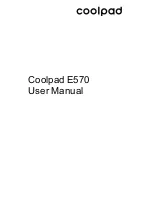
16
Home screen & apps
•
In Google Play Store, check the app’s ratings and comments
before installing.
•
If you doubt the safety of an app, don’t install it.
•
Like all apps, downloaded apps will use up memory, data,
battery, and processing power—some more than others.
For example, a simple battery level widget will use less than
a streaming music player app. After installing an app, if
you’re not happy with how much memory, data, battery or
processing power it’s using, uninstall it. You can always
install it again later.
•
Just like web browsing, you may want to monitor children’s
access to apps to help prevent exposure to inappropriate
content.
•
Certain apps may not provide completely accurate
information. Take care, especially when it comes to personal
health.
Take care of your apps
From your home screen tap Apps
, then swipe left to scroll
through apps. To close the apps screen, tap Home
or
Back
.
• Uninstall apps:
Tap Apps
>
Settings
>
Apps
. Swipe
left to
ALL
, tap an app, then tap
Disable
or
Uninstall
(if
available).
Disable
removes the app from your menu—to
Enable
it,
reopen this window and tap
Enable
(disabled apps are at the
bottom of the list).
If an app locks up your phone as soon as you turn it on,
restart in Safe Mode: Turn off your phone, then turn it back
on—when you see the “Motorola” logo during power-up,
press and hold the Volume Down key until you see the home
screen, with
Safe Mode
in the lower left. Then, try removing
the app.
• Reinstall apps:
To reinstall apps from Google Play Store, tap
Apps
>
Play Store
, then tap
Play Store
(in the upper
left) >
My Apps
. The apps you downloaded are listed and
available for download.
• Share, show, or clear app details:
Tap Apps
>
Settings
>
Apps
. A bar at the bottom tells you how
much app storage space you have left. Swipe left or right to
see the list of
DOWNLOADED
,
RUNNING
, or
ALL
apps, then
tap an app in the list to show its details and storage usage.
You can tap
Clear data
,
Clear cache
, or other options.
2014.08.07
FCC DRAFT
















































